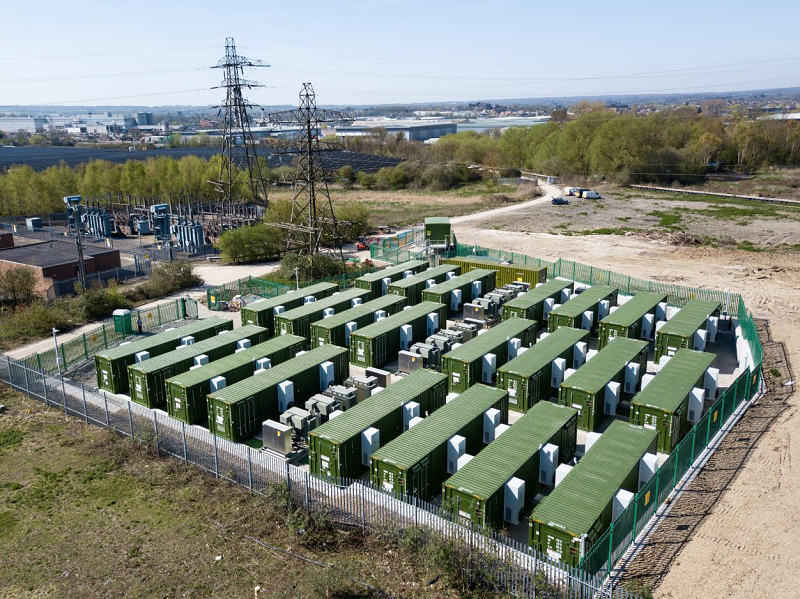Leaders of Britain’s solar developers will meet two influential Parliamentary committees this afternoon, battling to shorten ‘farcical’ delays in connecting new batteries and PV farms. Too often, say industry representatives, such waits now stretch into the 2040s.
One regional distribution operator, Northern Powergrid, has been accused of foot-dragging on a grid connection, after being unable to improve on a twelve-year wait to hook up one developer’s battery project.
Solar park builder Enviromena has taken the unusual step of issuing a public statement, accusing the DNO of “stifling” investment. The developer accuses Northern Powergrid of jeopardising the viability of its unbuilt farm at West Sleekburn, Northumberland.
Enviromena says its 30MW battery addition to the plant received planners’ approval in October 2022. But after talks, the DNO now can guarantee no grid connection date for the intended battery before October 2036.
According to the developer, Northern Powergrid indicated in discussions last year that its grid supply point at Blyth might enable an earlier connection, possibly available under the DNO’s Delegated Technical Limits programme.
The developer had hoped to confirm that earlier connection date before Christmas. But Northern Powergrid later told it that the Blyth hub had been removed from the DNO’s programme of accelerated connections, due to technical reasons. The developer says the grid company can commit to no alternative before the already stated deadline twelve years from now.
Enviromena CEO’s Chris Marsh said in a statement: “We are extremely disappointed with the latest delay, which has left a key project without a feasible connection date despite being ready to construct.
“The North East is enjoying a renaissance for clean energy as it emerges as a key hub for renewables, Marsh went on.
“The actions of Northern Powergrid go directly against the Government’s wider agenda to move away from fossil fuels and achieve carbon Net Zero goals by 2050 and it is stifling investment in the area. The delay represents a major setback.”
He added: “We submitted details to Northern Powergrid demonstrating our West Sleekburn project was ready for an earlier connection with both planning and land rights in place.
“The site is ready to provide much-needed storage facilities for cleaner energy. I would urge Northern Powergrid to re-focus their efforts on resolving the issues at Blyth and kickstarting accelerated connections in the area.
“We have seen other network operators across the country accelerate connection dates by as much as thirteen years in recent weeks and we hope a similar resolution can be found for the Sleekburn project.”.
Marsh cited the National Grid’s estimates that Britain will need over 25GW of battery storage, up from 1GW today, if it is to decarbonise the nation’s grid by 2035.
Reading-based Enviromena last month announced it was about to submit a total of 400MWp new unbuilt PV farm proposals for planners’ consideration, en route to an intended 500MWp goal next year.
Responding in a statement, Northern Powergrid confirmed the developer’s account. The operator said it was working hard to bring forward connection dates for customers with schemes delayed by constraints on the transmission network owned and operated by National Grid.
The DNO commented: “Towards the end of last year, we announced that we would be issuing revised connections offers for some customers, made possible through a programme of delegated technical limits”.
“Customers looking to connect at a major substation at Blyth in Northumberland were included in the proposal for the first phase of this work.
“However, after further scrutiny by ourselves and National Grid, it will not be possible during this stage of the programme and so we’re re-evaluating what we can do to support customers looking to connect to this area of our network.
“We remain committed to working with our customers whose projects are impacted and to keeping them informed about the actions we are taking to accelerate grid connections in our region”.
This afternoon trade body SolarEnergyUK will present to MPs evidence of what it calls connection delays ‘descending into farce’. Queues to connect to the grid, at both low and high voltage, now surpass 500GW, the group claims, citing a recent estimate by consultancy Roadnight Taylor.
Reforms such as the ‘Technical Limits’ programme, intended to deliver connections for big batteries and generating assets in advance of reinforcements to the transmission grid, would only be possible if output from the new supply assets was cut at source, DNOs have told Solar Energy UK said.
The most permissive limit seen by the body is 63%, in return for a connection date being brought forward by a year. In some cases, said the group, developers have been told that this limit is zero, with not a single solar-powered electron being allowed to flow.
Grid consultancy Novogrid has seen 50 such messages over the past three months, all with curtailment above 90%.
“You couldn’t make it up“, said SolarEnergy UK CEO Chris Hewett. “It is like being told you can open a shop on the High Street, as long as you keep the doors locked.
“This is bizarre behaviour“, he added, “an apparent attempt by the DNOs to make it look like they are doing something while they still fail to invest in vital upgrades.”
Hewett will present this afternoon to the Commons’ environmental audit committee. On the same topic also this afternoon, grid commissioner Nick Winser will answer MPs on the committee shadowing the D-ESNZ ministry. Coverage begins at 14:00; click on the links to view a live TV feed.





The lack of transmission capacity of the UK National Grid has been known for years, but building overhead transmission lines don’t gain votes, on the contrary the pylons often receive local opposition and lose votes. It is likely that by 2050 most of the UK’s primary energy demand, presently around 2,000 TWh will need to be delivered by electricity with around 30% of it then converted into hydrogen according to the Government hydrogen strategy of August 2021. Considering that today only 20% of primary energy is delivered by electricity, ramping it up to around 80% requires long term thinking and action which our politicians are not good at.
Your wise words as ever, David.
What measures do other readers of The Energyst consider policy- and law-makers need to deliver immediately, so that our necessary, radical and utterly unprecedented re-shaping can be achieved within a decade to green Britain’s grid? What are the essentials of a constructive and constructed ‘war footing’, needed to transform the NG? Which other countries are achieving such transformations better? And how? Evidenced contributions are very welcome.
Is it not the primary and fundamental role of Ofgem to ensure that DNOs and TSOs have sufficient grid capacity to serve our needs?
Where is the accountability of the Ofgem leadership from 10 years ago who didn’t look far enough ahead and commence the build out of network capacity (or looked at it and didn’t want to raise electricity costs on their watch to pay for it)?
Where is the current accountability of Ofgem and the NGESO for demonstrating that they are now doing sufficient to ensure that in 10 years time we aren’t faced with the same thing.
The oversight of Ofgem is a real concern. Its precious independence looks very much like unaccountability at times.